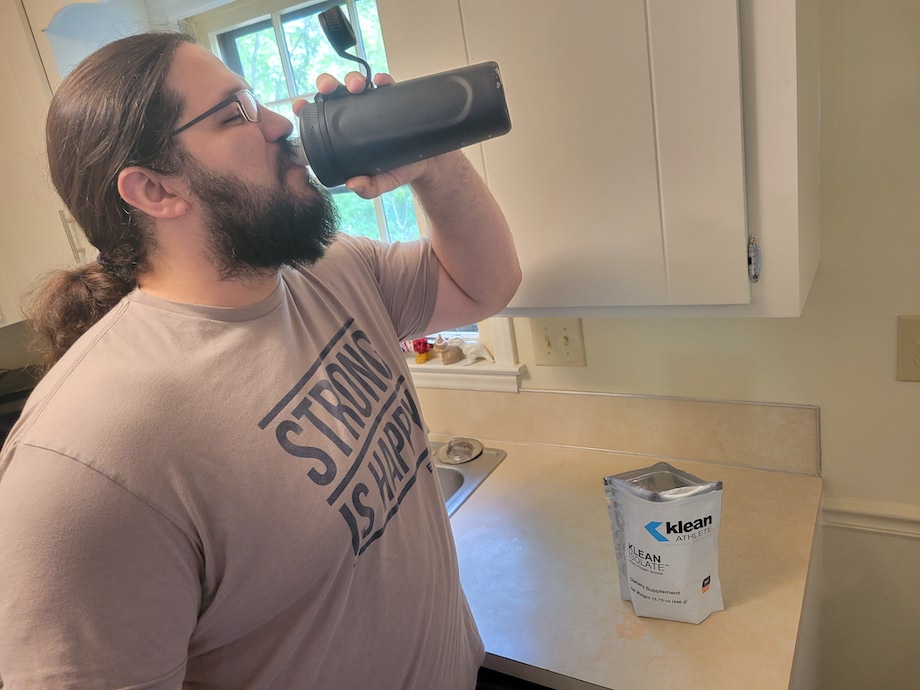We test and review fitness products based on an independent, multi-point methodology. If you use our links to purchase something, we may earn a commission. Read our disclosures.
You probably know of the importance of protein for building muscle, and supplementing the best protein powder to hit your fitness goals, but what’s talked about less often are the benefits of protein powder when it comes to weight loss. It begs the question: Is protein powder good for weight loss?
I talked with USA Weightlifting’s sports dietitian Meagan O’Connor, RD, about whether or not protein powders are beneficial for weight loss. Here, we’ll break down that question as well as talk about possible benefits of using high-protein foods or protein powders while losing weight. Read on for all your weight loss questions answered about this vital macronutrient.
Medical disclaimer: This article is intended for educational and informational purposes only. It is not intended as a substitute for medical advice. For health advice, contact a licensed healthcare provider.
Is Protein Powder Good for Weight Loss?
Generally speaking, yes, protein powder can be helpful in weight loss. However, there are some factors to consider that will impact a protein powder’s effectiveness at helping you lose weight.
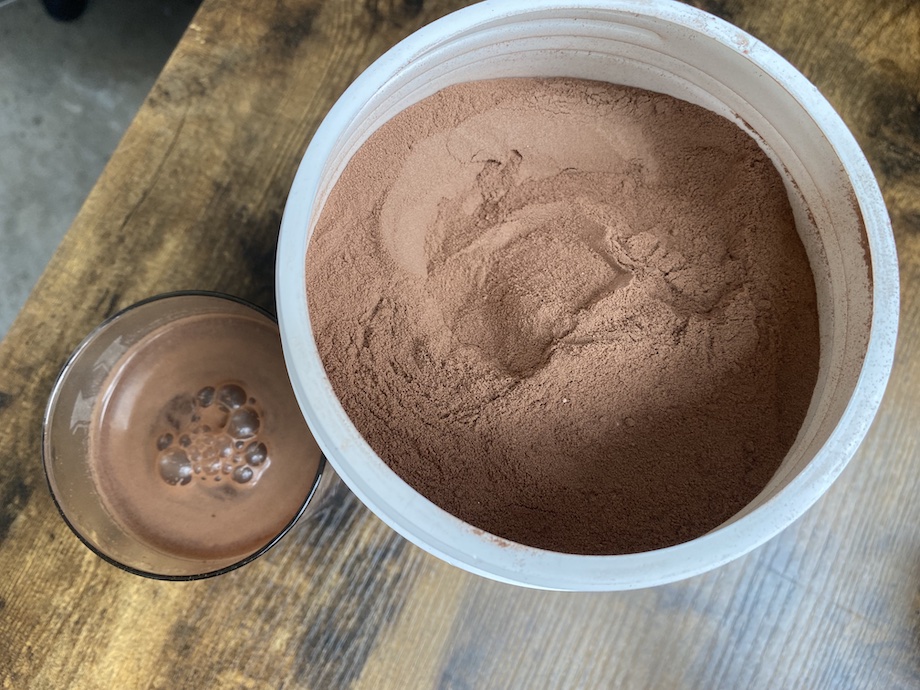
Research1 has shown that a high-protein diet including protein supplementation can be beneficial to weight loss, but it’s important to note that in order for a person to lose weight, they must be in a calorie deficit. You must be consuming fewer calories than you are expending; just drinking protein shakes won’t do enough alone.
Meagan adds, “Protein powder can be helpful while you’re trying to lose weight because it’s an easy source of protein without adding excess calories.” Additionally, she mentions a second benefit: “Adequate protein helps you maintain lean mass while trying to drop mainly body fat.”
To see results of weight loss (and maintain muscle mass) while using protein powder, it’s important to eat properly, limiting calories, as well as exercise regularly, including resistance training. Because we’re wanting to limit our calorie intake, the protein powder we use should have a high protein content and also not too many calories or added sugars. In addition, the protein powder shouldn’t have a lot of fats and carbs—just a good amount of protein.
RELATED: How to Lose Body Fat
How Protein Powder Helps with Weight Loss
There are quite a few ways that protein—and protein powder in particular—can help promote weight loss with proper dieting and exercise.
Keeps You Feeling Full
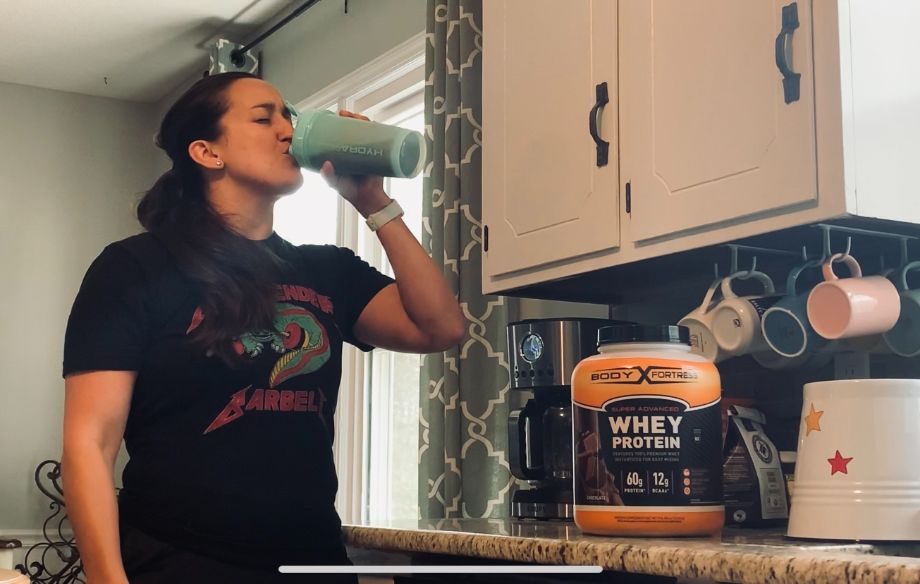
Protein has been consistently shown to increase satiety after a meal more so than fats or carbohydrates, according to a review from the American Journal of Clinical Nutrition2. So protein from foods and supplements will help you feel full and feel full longer. This can help stave off cravings, which can lead to a lower calorie intake overall and help support weight loss, according to a review from 20183.
Helps Burn Calories
Studies4 have shown that the simple act of eating protein burns more calories than eating fats or carbs. Protein affects thermogenesis, or the production of heat in the body. This increased heat helps burn more calories during digestion. More calories burned can help burn fat and support overall weight loss.
While protein has been shown to aid in fat loss and weight loss, it doesn’t target specific areas of fat—like belly fat. This comes from a common myth known as “spot reduction,” which claims certain stubborn areas can be targeted through dieting and exercising those areas. There is no research that shows this to be the case, though; it’s simply not true. Protein can help with fat loss, but not any specific area of fat.
Is Convenient
It can be challenging to get enough protein in your diet throughout the day, even with weight loss goals. We’re constantly on the move and have busy schedules, so protein powder is a source of protein we can add that is easy to throw in a shake before heading out the door.
It’s much easier to prepare a protein shake than to properly cook a cut of lean meat. While the majority of our protein intake should come from whole foods, including protein powder helps ensure we’re meeting our daily intake of protein to maximize the health benefits of protein.
Other Health Benefits of Protein Powder
While increased satiety and burning calories are great benefits of protein powders targeted toward weight loss, there are some other benefits. These are great benefits for improving your body composition: reducing body fat and body weight while maintaining lean muscle mass.
Helps Build and Maintain Lean Muscle
A 2008 review2 suggests that a healthy diet high in protein may aid in stimulating muscle growth, as well as maintaining lean muscle mass. This is important during a calorie deficit, so that the weight loss is more fat loss and less lean body mass. If the goal is weight gain, then it’s important to eat enough protein so that the majority of the weight gained is lean muscle mass.
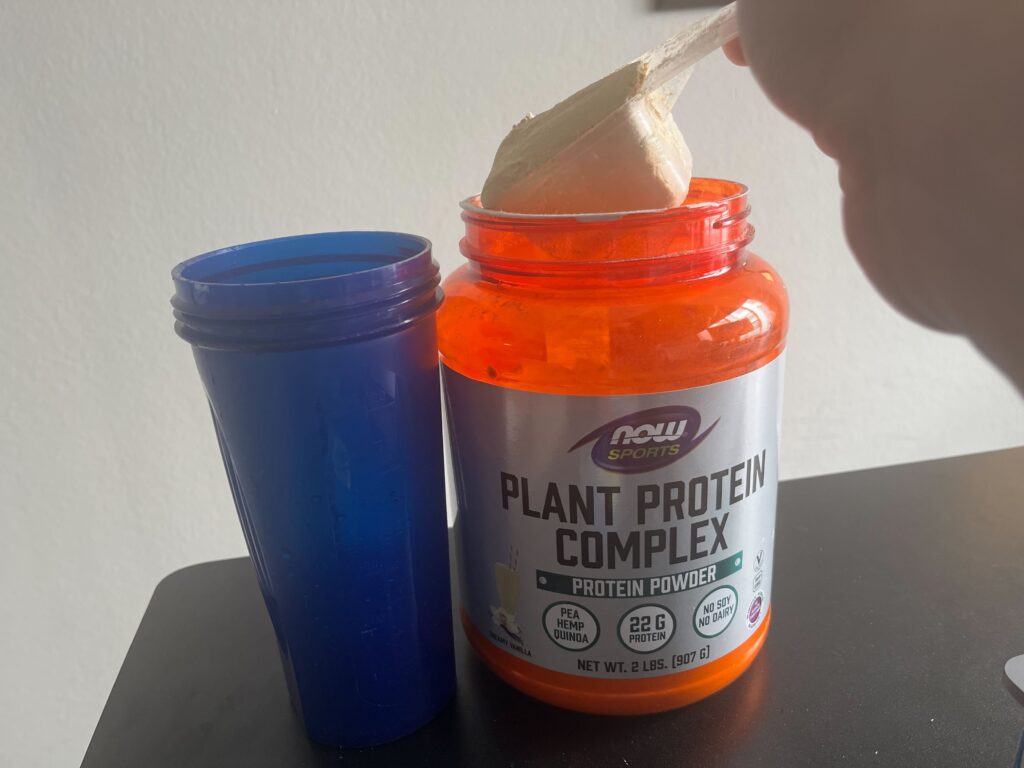
A 2019 review from Nutrients5 emphasizes the importance of getting enough dietary protein to maintain optimal health during all stages in life. The Recommended Daily Allowance (RDA) of protein is currently at 0.8 grams of protein per kilogram of body weight, and it’s defined as the necessary protein intake required to prevent muscle loss. However, the review talks about many studies that have shown greater benefit to a greater protein intake, even with weight loss.
Is Budget-Friendly
Protein powder is typically a budget-friendly source of protein, when you account for the price per serving. While a healthy diet shouldn’t consist solely of protein powder, it is a nice way to ease up on weekly food costs.
Additionally, protein powder has a long shelf life if stored properly, often lasting over a year in adequate conditions.
Helps Meet Daily Intake
As I said before, it can be difficult to meet the daily quota of protein intake when you’re constantly on the move. A quick scoop of casein powder in a protein drink before you go to bed can get you enough protein for the day.
But it begs the question: How much protein do I need? Let’s look into that now.
Daily Protein Intake for Losing Weight
The minimum Recommended Daily Allowance, or RDA, of protein intake starts at 0.8 grams of protein for every kilogram of body weight. This is known as the minimum to avoid a deficiency in protein. However, research has shown that a greater daily intake could be beneficial for athletic performance as well as weight loss.
While in a calorie deficit, we don’t just burn fat, but can burn muscle, too. Making sure you are consuming enough protein can help minimize that muscle loss.
RELATED: High-Protein Foods for Weight Loss
The range of ideal protein intake for weight loss changes from study to study. A review from 20116 suggests that a protein intake ranging from 1.8 to 2.0 grams of protein per kilogram of body weight may help prevent lean mass loss while in a calorie deficit.
A 2017 statement from the International Society of Sports Nutrition7 recommends a greater range—1.6 to 2.4 grams of protein per kilogram of body weight—will help promote fat loss while minimizing loss of muscle during a calorie deficit.
Furthermore, the person’s background can factor into protein needs. According to a randomized clinical trial in 2015 from Clinical Nutrition8, people with obesity can see benefits with muscle mass with slightly lower levels of protein during weight loss—at least 1.2 grams per kilogram.
While there may be no exact consensus on the optimal intake of protein for weight loss, the beneficial range seems to land between 1.6 and 2.4 grams of protein per kilogram of body weight.
RELATED: How Much Protein Do I Need to Lose Weight?
What to Look for In Protein Powders for Weight Loss
The best protein powders for weight loss emphasize protein and minimize calories. Not every protein powder is going to emphasize these main points, though; some are made more for building muscle or weight gain and bulking. In your search, Meagan suggests, “If you’re looking to lose weight, look for protein powders that have minimal ingredients.”
Protein Content
The amount of protein in a serving should be high enough to help you hit your daily macronutrient needs. If there isn’t a lot of protein, it won’t really help you meet that daily intake. A good range of protein per serving is probably around 19 to 30 grams.
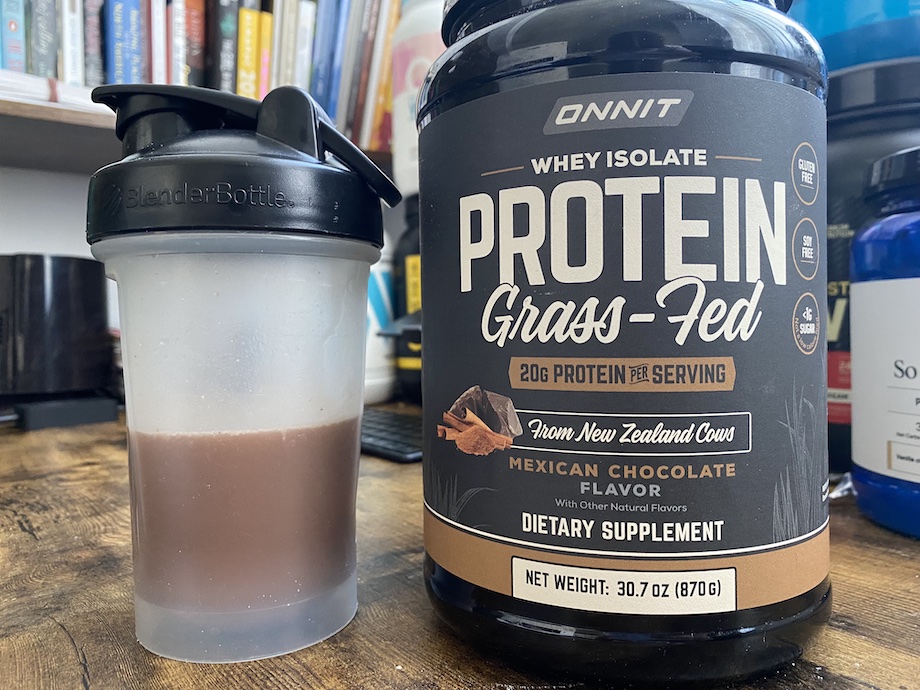
As a side note, when it comes to protein for weight loss, these powders should prioritize protein and be low in fat and carbohydrate content. While not the only protein to fit the bill, Meagan suggests whey protein isolate to keep the ingredients and macros simple; it has at least 90% protein.
Calorie Content
Again, to achieve a low calorie count, there shouldn’t be a lot of calories from fats and carbs. Additionally, some proteins can be calorie rich, having up to 200 calories in just one serving. Look for protein powders that don’t hike up your calorie intake for the day to easily maintain a calorie deficit.
Quality
This is a point for protein powders for any goals, weight loss or muscle building. There are many options for protein powders on the market, but not all were created equally. Try your best to find clean protein powders with high-quality ingredients.
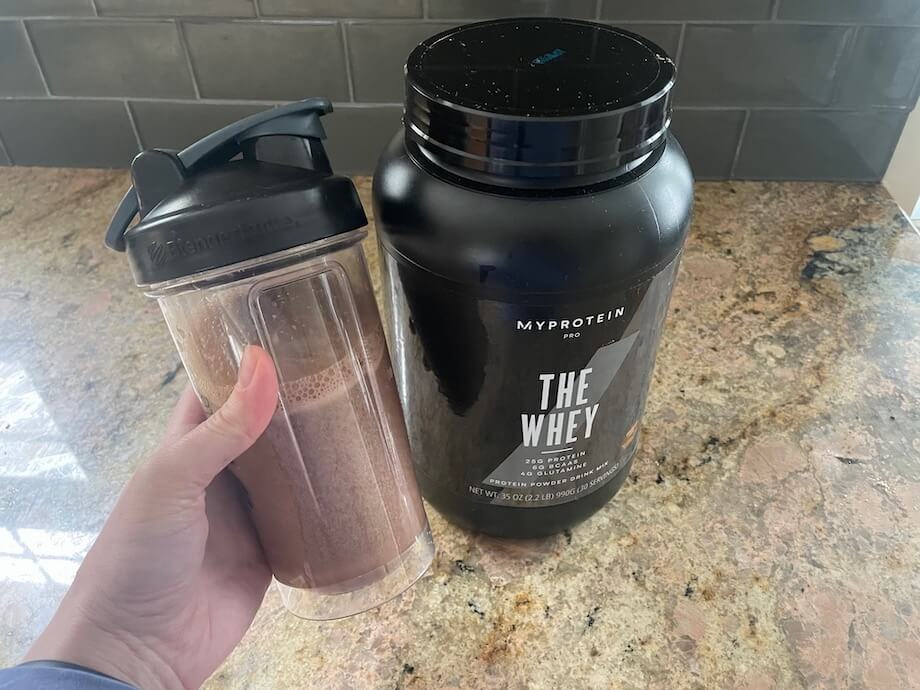
If using animal-derived protein powder like whey or casein protein, look for grass-fed protein powders. Avoid added sugars in favor of unsweetened or naturally sweetened alternatives. Certified non-GMO protein powders are also a plus.
While artificial sweeteners aren’t always a bad thing, Meagan says you should still be aware of them. “A lot of times, [too much] sugar alcohol, such as erythritol…can make you feel bloated, gassy, or give you diarrhea.” This can put a hindrance on your daily activities, such as training. Make sure you know what’s in your supplements, and keep the artificial sweeteners to a minimum.
Other Factors
Here are a few other factors to consider in choosing a protein powder, based on preferences:
- Allergies and sensitivities: Those who are lactose intolerant or have a dairy sensitivity may need to avoid whey protein powders (and casein) in favor of plant-based protein powders. Additionally, some plant proteins such as pea protein or soy protein9 have been shown to cause allergic reactions for some. Choose a protein that has fewer allergy cases, like hemp protein10. Also, look for gluten-free options if you have sensitivities to it.
- Amino acids: Animal protein is considered a complete protein, due to the fact that it contains all 12 essential amino acids—amino acids that can’t be produced by the body and are vital to any diet. Not all plant proteins have all essential amino acids, so make sure to supplement your plant protein with other protein sources, like brown rice, to get all essential aminos. Rice protein is also added to some plant-based proteins.
- Budget: Along with the variety of protein powders on the market, are a variety of prices. There are great options at most any price range, so make sure to choose a protein that falls within your budget.
- Flavors: There are a ton of protein powders, and each brand has tons of flavors to choose from. Experiment with different flavors and find one you like!
Is Protein Powder Good for Weight Loss? Final Thoughts
Protein powder is absolutely good for weight loss, although it’s not a miracle drug. Here are the main things to remember to optimize weight loss and lean muscle mass:
- Even if you’re taking protein powder, your diet needs to be in a calorie deficit, meaning you’re expending more calories than you’re consuming.
- To best maintain lean muscle mass, make sure to have enough protein daily, ranging from 1.6 to 2.4 grams of protein per kilogram of body weight for most people.
- In choosing a good protein powder for weight loss, the emphasis should be on high-quality protein with lower carb and fat amounts, along with lower calorie content.
Is Protein Powder Good for Weight Loss? Q&A
Should you use protein powder for weight loss?
Protein and protein powder are great for weight loss, as protein is the most satiating of the three macronutrients, more so than fats or carbohydrates2.
Which type of protein powder is best for weight loss?
Here are our picks for the best protein powders for weight loss:
Best Overall Protein Powder for Weight Loss: MyProtein Impact Whey Protein
Best Protein Powder for Low Carb and Sugar Content: Jacked Factory Authentic Whey
Best Casein Protein Powder for Weight Loss: Legion Athletics Casein+ Casein Protein Powder
Best Tasting Protein Powder for Weight Loss: XWERKS Grow
Best Plant-Based Protein Powder for Weight Loss: KOS Vegan Protein Powder
Best Protein Powder for Weight Loss for Men: Kaged Re-Kaged
Best Protein Powder for Weight Loss for Women: Cira Bright Whey Protein
Best Whey Protein Powder for Weight Loss: Kaged Whey Protein Isolate
Best Budget Protein Powder for Weight Loss: Optimum Nutrition 100% Gold Standard Whey
Best Protein Powder for Weight Loss for Meal Replacement: Quest Nutrition Protein Powder
Best Protein Powder for Weight Loss for Energy Boost: Garden of Life Sport Grass-Fed Whey
Best Unflavored Protein Powder for Weight Loss: NOW Sports Nutrition Whey Protein Isolate
Best Organic Protein Powder for Weight Loss: Legion Athletics Whey+ Whey Isolate Protein Powder
Should I take protein powder with or without food?
Typically, having a protein shake on an empty stomach shouldn’t bother you. There are a couple other factors that may impact how your stomach feels, however. If you have sensitivities to dairy products, then you may want to avoid whey or casein protein. Additionally, low-carb protein powders sweetened with sugar alcohols can cause bloating or gas if taken in excess.
These statements have not been evaluated by the Food and Drug Administration. This product is not intended to diagnose, treat, cure, or prevent any diseases.
References
- Treyzon L, Chen S, Hong K, Yan E, Carpenter CL, Thames G, Bowerman S, Wang HJ, Elashoff R, Li Z. A controlled trial of protein enrichment of meal replacements for weight reduction with retention of lean body mass. Nutr J. 2008 Aug 27;7:23. doi: 10.1186/1475-2891-7-23. PMID: 18752682; PMCID: PMC2538539.
- Paddon-Jones D, Westman E, Mattes RD, Wolfe RR, Astrup A, Westerterp-Plantenga M. Protein, weight management, and satiety. Am J Clin Nutr. 2008 May;87(5):1558S-1561S. doi: 10.1093/ajcn/87.5.1558S. PMID: 18469287.
- Koliaki C, Spinos T, Spinou Μ, Brinia ΜE, Mitsopoulou D, Katsilambros N. Defining the Optimal Dietary Approach for Safe, Effective and Sustainable Weight Loss in Overweight and Obese Adults. Healthcare (Basel). 2018 Jun 28;6(3):73. doi: 10.3390/healthcare6030073. PMID: 29958395; PMCID: PMC6163457.
- Halton TL, Hu FB. The effects of high protein diets on thermogenesis, satiety and weight loss: a critical review. J Am Coll Nutr. 2004 Oct;23(5):373-85. doi: 10.1080/07315724.2004.10719381. PMID: 15466943.
- Carbone JW, Pasiakos SM. Dietary Protein and Muscle Mass: Translating Science to Application and Health Benefit. Nutrients. 2019 May 22;11(5):1136. doi: 10.3390/nu11051136. PMID: 31121843; PMCID: PMC6566799.
- Phillips SM, Van Loon LJ. Dietary protein for athletes: from requirements to optimum adaptation. J Sports Sci. 2011;29 Suppl 1:S29-38. doi: 10.1080/02640414.2011.619204. PMID: 22150425.
- Jäger R, Kerksick CM, Campbell BI, Cribb PJ, Wells SD, Skwiat TM, Purpura M, Ziegenfuss TN, Ferrando AA, Arent SM, Smith-Ryan AE, Stout JR, Arciero PJ, Ormsbee MJ, Taylor LW, Wilborn CD, Kalman DS, Kreider RB, Willoughby DS, Hoffman JR, Krzykowski JL, Antonio J. International Society of Sports Nutrition Position Stand: protein and exercise. J Int Soc Sports Nutr. 2017 Jun 20;14:20. doi: 10.1186/s12970-017-0177-8. PMID: 28642676; PMCID: PMC5477153.
- Weijs PJM, Wolfe RR. Exploration of the protein requirement during weight loss in obese older adults. Clin Nutr. 2016 Apr;35(2):394-398. doi: 10.1016/j.clnu.2015.02.016. Epub 2015 Mar 6. PMID: 25788405.
- Hertzler SR, Lieblein-Boff JC, Weiler M, et al. Plant proteins: Assessing their nutritional quality and effects on health and physical function. Nutrients. 2020;12(12):3704. doi: 10.3390/nu12123704
- Shen P, Gao Z, Fang B, et al. Ferreting out the secrets of industrial hemp protein as emerging functional food ingredients.Trends Food Sci Technol. 2021;112:1-15. doi: 10.1016/j.tifs.2021.03.022
Further reading

In order to continue to grow, the CrossFit Games needs an enemy. Here's why... Read more

REP’s newest signature bar is here; in our REP Fitness Colorado Bar review, see how it stacks up to the competition. Read more

The definitive guide to REP Bumper Plates vs Rogue Bumper Plates: Find out which plates you should buy for your home. Read more

What is creatine and how does it work? A registered dietitian analyzes creatine's pros and cons, including its muscle-building benefits and possible side effects. Read more

